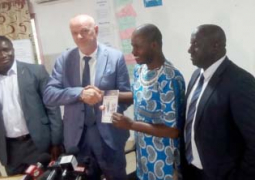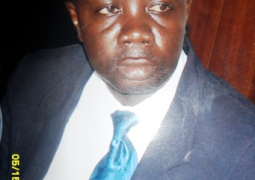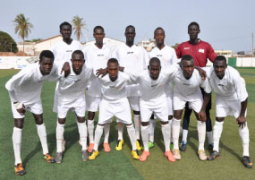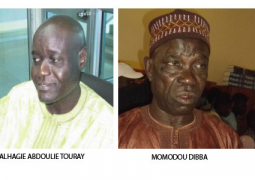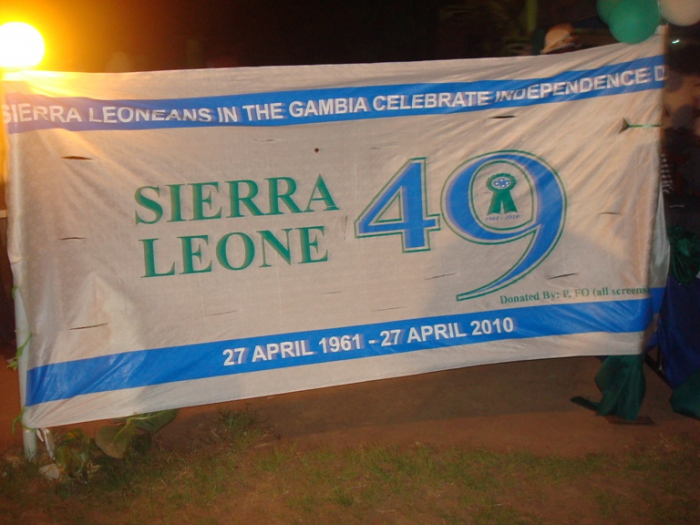
Independence is celebrated due to the feeling of being free from another power. Sierra Leone attained Independence on 27th April 1961, thus celebrating their 49th Independence Day recently. It is one of those countries who attained independence without bloodshed but by a matured and peaceful means headed by Sir Milton Margai, the first Prime Minister under the Sierra Leone Peoples' Party (SLPP.) Sierra Leoneans in The Gambia did not stay behind this year in celebrating their national day at the Independence Stadium Hostel grounds. The Sierra Leone Embassy gathered Sierra Leoneans through the Sierra Leone Nationals Union (SLENU) in rejoicing and gladness.
In giving statement on behalf of the Acting High Commissioner, Mr. Duwai S. Lungi on the occasion marking Sierra Leone's 49th Independence Anniversary, Mrs. Fatamata E. Kargbo, the First Secretary at the High Commission, reiterated the need for Sierra Leoneans to come together as one and love one another.
She said it was with great honour and privilege that she stood before them that day to commemorate and celebrate the 49th Independence Anniversary of their great country, Sierra Leone.
She said: "As well as we may be aware, the rebirth of our nation took place on 27th April 1961. That was a day when Sierra Leone as a nation and Sierra Leoneans as a people decided to take our destiny into our own hands from the British, a day that ended over 200 years of British colonial rule. A day that they all decided to come together as one people and one country to rebuild Sierra Leone and shape the future of its children for generations yet unborn."
She further said that the road to the achievement of their independence as they look back at the history of their country was not an easy journey. "It was not an easy journey before independence nor after its attainment 49 years ago. The problems and difficulties we have been facing are partly due to our own making, while part of it can be attributed to external factors that we had encouraged over the years to bring disunity and division amongst us as a people and as a country," she said.
Against this background, she added that they want to start addressing the factors that have been responsible for tearing their nation apart and to appeal to their people back at home and in the Diaspora to join hands together to help rebuild, develop and change the image of their country.
"We all know that we have the resources, both human and material, to make Sierra Leone a better place, a nation that we could be proud of and that could become the envy of all, not only on the African continent but in the whole world," she emphasised.
The First Secretary urged Sierra Leoneans to embrace SLENU and to stand up and be counted so as to know who is where. She said people should know that they have to register with the Embassy through SLENU to make their work simpler. Every Sierra Leonean should be a registered member of the Embassy, this she said, would enable them to know their members and to stand for them if anything happens. "All clubs should be registered under SLENU before registering with the Embassy. We have to put things right and come together as one. We need to unite so that we can stand," she said.
On the attainment of independence in 1961, Mrs Fatmata E. Kargbo says, "We were already known to be the Athens of West Africa, a citadel of higher learning in Africa, south of the Sahara. Many nations came to acquire the knowledge they needed to help rebuild their own countries on the attainment of their own independence."
"The question we need to answer is how do we go about rebuilding our country, especially after having experienced ten years of bloody civil war, a war that now forms the most bitter part of our history. And that can be compared in modern times only to the slave trade that dehumanised us as a people and a country to an extent beyond human imagination," she said.
Mrs. Fatmata Kargbo posited that is why the theme in this year's message to all of us in The Gambia is attitudinal change among Sierra Leoneans and the empowerment of the Sierra Leone National Union (SLENU), in bringing together our community in The Gambia and beyond to help make Sierra Leone a better place and Sierra Leoneans a better people in contributing to the development efforts of their host nation, The Gambia.
She revealed that the Sierra Leone High Commission in The Gambia in collaboration with the Sierra Leone National Union (SLENU) has decided to bring together all the activities marking this year's independence celebration of the different groups under one umbrella, so that we can see ourselves as one people belonging to one country.
Dr. Fomba gave the history of Sierra Leone and how the political parties of the Sierra Leone, People's Party and the All Peoples' Congress came about. He revealed that the SLPP had ruled the country under Sir Milton Margai and Sir Albert Margai. Sir Milton, he said, signed the treaty for independence.
The SLENU Chairman, John Kanu, urged all Sierra Leoneans to embrace SLENU so that things would work easy for all, noting that no one would be left behind. Sheikh Sesay, Imam of the Muslim Jamat, talked on unity and love for one another. Pastor Komayeh of ASLEM remarked that grudge hinders their unity, and urged people to avoid grudge and come together. "Greed, is another one. We do not share with our fellow Sierra Leoneans. Tribalism is another. Political connection is another in the life of our people. The elders should encourage the young and the young should not copy bad attitudes from the elders so that they can handle the future at ease. All women should come together to build the nation. The elders should continue talking to us. Let us take SLENU registration as vital. Let refugee registration not be the last registration. Next year will be a big year for us, our 50th anniversary. We should put our talents together and see how we can make it bigger, " he said.
The historic event was characterised by performances from different cultural dance troupes.


